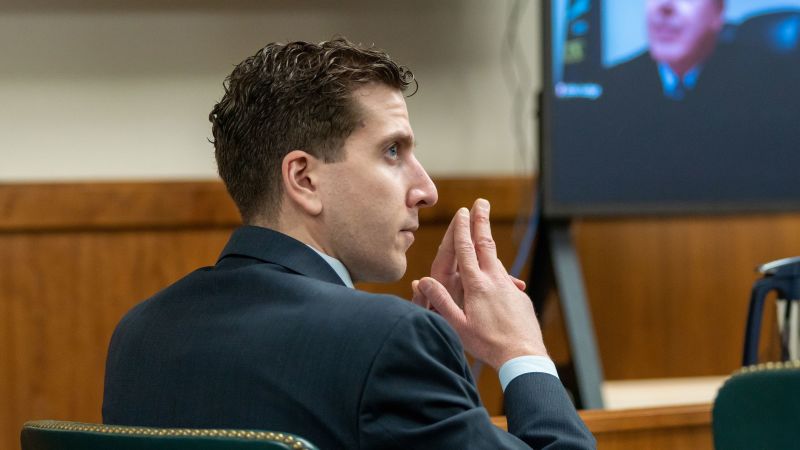A month before the scheduled start of his murder trial in the 2022 killings of four Idaho college students, defendant Bryan Kohberger is expected to enter a plea deal that would remove the possibility of the death penalty, according to information shared with victims’ families. The hearing is set for 11 a.m. Wednesday in Boise, Idaho, before state district Judge Steven Hippler. This development, reported by the Idaho Statesman, marks a significant turn in a case that has captivated national attention.
Kohberger, a 30-year-old former PhD student of criminology, faces four counts of first-degree murder and one count of burglary in Latah County, Idaho. The plea deal has been met with mixed reactions, including condemnation from at least one victim’s family. The proceedings are expected to be straightforward, with Judge Hippler reading the plea offer to Kohberger and confirming his understanding of the consequences.
The Case That Gripped a Nation
The brutal killings of Ethan Chapin, Xana Kernodle, Kaylee Goncalves, and Madison Mogen in a Moscow home shocked the community and the nation. The crime scene showed no signs of forced entry, leaving many questions about how the killer entered and exited undetected. The lack of clear motive or connection between Kohberger and the victims adds to the mystery.
Despite the anticipated plea deal, key questions remain unanswered: How and why were these victims chosen? Why were other roommates spared? The trial would have likely explored these mysteries, but now answers may only emerge during a sentencing hearing where victim impact statements are expected.
Unanswered Questions and Lingering Mysteries
Why the Victims Were Targeted
The victims, all students at the University of Idaho, were part of a close-knit group. On the night of November 12, 2022, they were out in Moscow and returned to their shared home, where they were later found dead. An attorney for Kohberger argued there was no connection between him and the victims, citing a lack of DNA evidence linking him to the crime scene.
However, reports suggest Kohberger’s now-deleted Instagram account followed the accounts of three victims, and he allegedly contacted one of them repeatedly before the murders. Kohberger also visited a restaurant where two victims worked, though it remains unclear if he interacted with them.
Why Two Roommates Were Spared
Xana, Goncalves, and Mogen shared their home with Dylan Mortensen and Bethany Funke, who were unharmed during the attack. Mortensen reported hearing crying and seeing a masked figure, later described as a male with bushy eyebrows, but did not recognize him. This figure left through a sliding glass door, leaving the roommates in shock and confusion.
Both surviving roommates were expected to testify at Kohberger’s trial, potentially shedding light on the events of that fateful night. However, their accounts now remain part of the unsolved puzzle.
How the Murders Were Carried Out
The plea deal does not guarantee Kohberger will reveal details of the crime. The victims’ families, particularly Goncalves’ father, have expressed a desire for closure, hoping Kohberger might disclose information about the murder weapon or other evidence.
An “edged weapon such as a knife” was used in the killings, with only a knife sheath found at the scene. Kohberger had purchased a military-style knife and sheath prior to the murders, and a selfie taken hours after the killings shows him smiling, raising questions about his state of mind.
Implications and the Road Ahead
The plea deal, if accepted, could bring a legal resolution to the case but leaves many questions unanswered. The victims’ families may have to wait until a sentencing hearing to hear more about the circumstances surrounding the murders. Such hearings often include emotional victim impact statements that underscore the personal toll of the crimes.
The case has highlighted challenges in the legal system, particularly in dealing with high-profile crimes where public interest and the demand for transparency are high. As the legal proceedings continue, the community and the nation remain focused on finding closure and understanding the full story behind the tragic events in Moscow.
Wednesday’s hearing may mark the end of one chapter, but the quest for answers and justice for the victims and their families continues.
 Iran Halts Cooperation with IAEA Amid Nuclear Facility Security Concerns
Iran Halts Cooperation with IAEA Amid Nuclear Facility Security Concerns American Men’s Wimbledon Drought: A 25-Year Quest for Glory
American Men’s Wimbledon Drought: A 25-Year Quest for Glory Jake Paul Enters WBA Cruiserweight Rankings, Eyes World Title Shot
Jake Paul Enters WBA Cruiserweight Rankings, Eyes World Title Shot Smart Mid-Year Financial Moves to Navigate Economic Uncertainty
Smart Mid-Year Financial Moves to Navigate Economic Uncertainty Iran Halts Cooperation with UN Nuclear Inspectors Amid Security Concerns
Iran Halts Cooperation with UN Nuclear Inspectors Amid Security Concerns